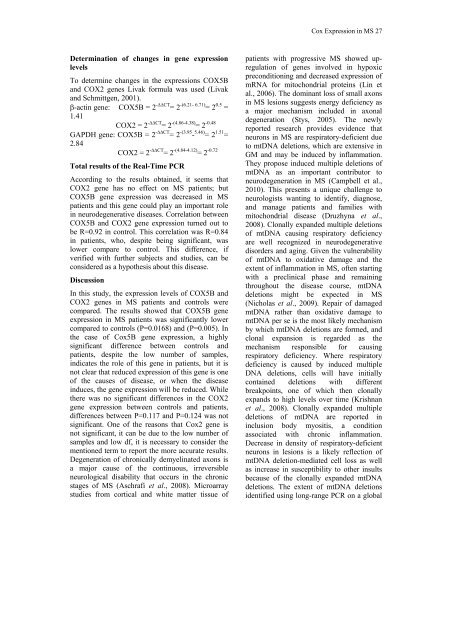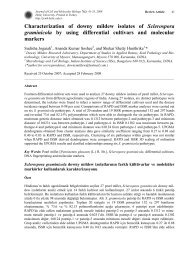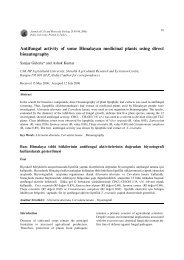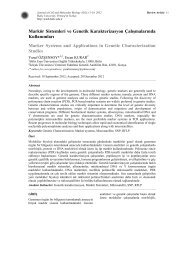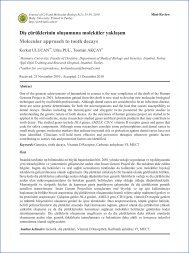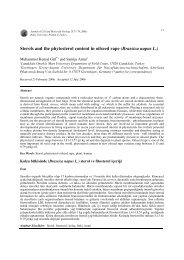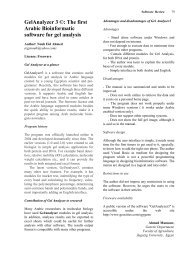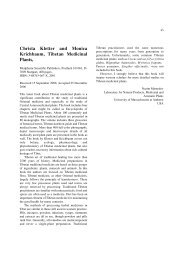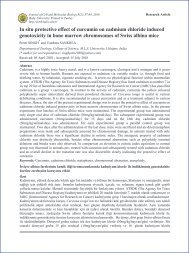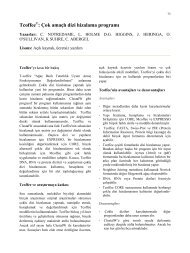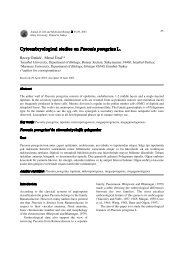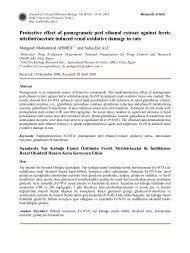10 2 Full Volume (PDF) - Journal of Cell and Molecular Biology ...
10 2 Full Volume (PDF) - Journal of Cell and Molecular Biology ...
10 2 Full Volume (PDF) - Journal of Cell and Molecular Biology ...
You also want an ePaper? Increase the reach of your titles
YUMPU automatically turns print PDFs into web optimized ePapers that Google loves.
Determination <strong>of</strong> changes in gene expression<br />
levels<br />
To determine changes in the expressions COX5B<br />
<strong>and</strong> COX2 genes Livak formula was used (Livak<br />
<strong>and</strong> Schmittgen, 2001).<br />
-actin gene: COX5B = 2 -CT = 2 -(6.21- 6.71) = 2 0.5 =<br />
1.41<br />
COX2 = 2 -CT = 2 -(4.86-4.38) = 2 -0.48<br />
GAPDH gene: COX5B = 2 -CT = 2 -(3.95 - 5.46) = 2 1.51 =<br />
2.84<br />
COX2 = 2 -CT = 2 -(4.84-4.12) = 2 -0.72<br />
Total results <strong>of</strong> the Real-Time PCR<br />
According to the results obtained, it seems that<br />
COX2 gene has no effect on MS patients; but<br />
COX5B gene expression was decreased in MS<br />
patients <strong>and</strong> this gene could play an important role<br />
in neurodegenerative diseases. Correlation between<br />
COX5B <strong>and</strong> COX2 gene expression turned out to<br />
be R=0.92 in control. This correlation was R=0.84<br />
in patients, who, despite being significant, was<br />
lower compare to control. This difference, if<br />
verified with further subjects <strong>and</strong> studies, can be<br />
considered as a hypothesis about this disease.<br />
Discussion<br />
In this study, the expression levels <strong>of</strong> COX5B <strong>and</strong><br />
COX2 genes in MS patients <strong>and</strong> controls were<br />
compared. The results showed that COX5B gene<br />
expression in MS patients was significantly lower<br />
compared to controls (P=0.0168) <strong>and</strong> (P=0.005). In<br />
the case <strong>of</strong> Cox5B gene expression, a highly<br />
significant difference between controls <strong>and</strong><br />
patients, despite the low number <strong>of</strong> samples,<br />
indicates the role <strong>of</strong> this gene in patients, but it is<br />
not clear that reduced expression <strong>of</strong> this gene is one<br />
<strong>of</strong> the causes <strong>of</strong> disease, or when the disease<br />
induces, the gene expression will be reduced. While<br />
there was no significant differences in the COX2<br />
gene expression between controls <strong>and</strong> patients,<br />
differences between P=0.117 <strong>and</strong> P=0.124 was not<br />
significant. One <strong>of</strong> the reasons that Cox2 gene is<br />
not significant, it can be due to the low number <strong>of</strong><br />
samples <strong>and</strong> low df, it is necessary to consider the<br />
mentioned term to report the more accurate results.<br />
Degeneration <strong>of</strong> chronically demyelinated axons is<br />
a major cause <strong>of</strong> the continuous, irreversible<br />
neurological disability that occurs in the chronic<br />
stages <strong>of</strong> MS (Aschrafi et al., 2008). Microarray<br />
studies from cortical <strong>and</strong> white matter tissue <strong>of</strong><br />
Cox Expression in MS 27<br />
patients with progressive MS showed upregulation<br />
<strong>of</strong> genes involved in hypoxic<br />
preconditioning <strong>and</strong> decreased expression <strong>of</strong><br />
mRNA for mitochondrial proteins (Lin et<br />
al., 2006). The dominant loss <strong>of</strong> small axons<br />
in MS lesions suggests energy deficiency as<br />
a major mechanism included in axonal<br />
degeneration (Stys, 2005). The newly<br />
reported research provides evidence that<br />
neurons in MS are respiratory-deficient due<br />
to mtDNA deletions, which are extensive in<br />
GM <strong>and</strong> may be induced by inflammation.<br />
They propose induced multiple deletions <strong>of</strong><br />
mtDNA as an important contributor to<br />
neurodegeneration in MS (Campbell et al.,<br />
20<strong>10</strong>). This presents a unique challenge to<br />
neurologists wanting to identify, diagnose,<br />
<strong>and</strong> manage patients <strong>and</strong> families with<br />
mitochondrial disease (Druzhyna et al.,<br />
2008). Clonally exp<strong>and</strong>ed multiple deletions<br />
<strong>of</strong> mtDNA causing respiratory deficiency<br />
are well recognized in neurodegenerative<br />
disorders <strong>and</strong> aging. Given the vulnerability<br />
<strong>of</strong> mtDNA to oxidative damage <strong>and</strong> the<br />
extent <strong>of</strong> inflammation in MS, <strong>of</strong>ten starting<br />
with a preclinical phase <strong>and</strong> remaining<br />
throughout the disease course, mtDNA<br />
deletions might be expected in MS<br />
(Nicholas et al., 2009). Repair <strong>of</strong> damaged<br />
mtDNA rather than oxidative damage to<br />
mtDNA per se is the most likely mechanism<br />
by which mtDNA deletions are formed, <strong>and</strong><br />
clonal expansion is regarded as the<br />
mechanism responsible for causing<br />
respiratory deficiency. Where respiratory<br />
deficiency is caused by induced multiple<br />
DNA deletions, cells will have initially<br />
contained deletions with different<br />
breakpoints, one <strong>of</strong> which then clonally<br />
exp<strong>and</strong>s to high levels over time (Krishnan<br />
et al., 2008). Clonally exp<strong>and</strong>ed multiple<br />
deletions <strong>of</strong> mtDNA are reported in<br />
inclusion body myositis, a condition<br />
associated with chronic inflammation.<br />
Decrease in density <strong>of</strong> respiratory-deficient<br />
neurons in lesions is a likely reflection <strong>of</strong><br />
mtDNA deletion-mediated cell loss as well<br />
as increase in susceptibility to other insults<br />
because <strong>of</strong> the clonally exp<strong>and</strong>ed mtDNA<br />
deletions. The extent <strong>of</strong> mtDNA deletions<br />
identified using long-range PCR on a global


